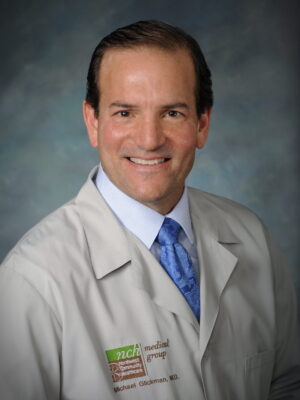Parents ask their COVID-19 questions
July 22, 2020
Part II of our Back to School series

Parents of school-aged children have a lot on their mind as the start of the academic year approaches. Every new school year is full of promise and uncertainty as kids fill their backpacks with school supplies, get their school physicals and try on their new school clothes. This year with COVID-19, the questions are multiplying, and the familiar routines are all thrown out the window.
Regardless of whether your child is going back to class full-time or on a hybrid schedule, parents have many questions on how to keep them safe outside their home. We asked Michael Glickman, M.D., Medical Director of the NCH COVID-19 Clinic, to provide some guidance and direction to help ease some of the anxiety. These are questions from parents and Dr. Glickman’s responses based on his experience and CDC guidelines.
Q: As we prepare to send our kids back to school, what precautions should we take? What should we expect of our schools and what should they expect of us as parents?
Dr. Glickman: The most important thing is to train and educate your children on how to social distance, protect themselves by wearing a mask and practicing good hand hygiene, and identify risky situations to avoid like hugging friends and holding hands. Schools should follow the guidelines issued by the CDC.
Q: What is the best way to disinfect backpacks, and how frequently should we do it?
Dr. Glickman: Wipe before and after school with approved disinfectant wipe.
Q: When a vaccine becomes available, will it be required of children like other immunizations or optional like flu shots? And if required, on what schedule for kids?
Dr. Glickman: These details are yet to be determined, but it will likely be recommended.
Q: In a pinch do Wet Ones® handiwipes actually help at all, or is hand sanitizer (gel) always better?
Dr. Glickman: The active ingredient in Wet Ones wipes is not on the list of those that are active against COVID-19. Antibacterial wet wipes and baby wipes also don’t contain the same ingredients as disinfectant wipes because they can irritate the skin. To be clear, brand names and descriptions are confusing; please read the ingredients. For example, Clorox has a product called Handi Wipes®, but it is for surfaces and used like a rag or sponge, not humans.
Q: How can we best enforce handwashing for kids while they are at school? A timer? Scheduled times throughout the day that everyone washes their hands? Sing a song while washing hands?
Dr. Glickman: Every time they enter or leave the classroom. Every time they leave their desk. For the younger children, YouTube has several cute short videos to encourage handwashing like this one with Elmo.
Q: From a parent and a teacher: how can we make sure kids keep their masks on?
Dr. Glickman: The most important thing that parents and teachers can do is to model the behavior. Just like putting on seatbelts, wearing a bike helmet and other key safety measures, kids tend to copy behavior they see regularly. Setting your expectations for behavior at home and school is a key role for parents.
Q: Is it healthy for young children (or anyone) to wear a mask six hours a day? Are there any potential consequences?
Dr. Glickman: There are no known adverse reactions of children over the age of two wearing masks. According to the American Lung Association, “Masks are designed to be breathed through and there is no evidence that low oxygen levels occur…There is absolutely no scientific evidence that mask wearing or physical distancing weakens the immune system.”
Q: What symptoms should parents watch for? I’ve heard so many rumors about symptoms. I don’t want to panic, but I do want to be aware.
Dr. Glickman: Symptoms to watch for are: fever, cough, body aches, loss of taste, smell, shortness of breath, fatigue, sore throat, runny nose, nausea, vomiting and diarrhea. The most concerning are fever, cough, shortness of breath and/or fatigue.
Q: Are children less likely than adults to transmit COVID-19 to each other?
Dr. Glickman: No, they actually are as likely or even more likely since they will generally have more hand contact with others and are less likely to practice good hand hygiene.
Q: Can you offer guidance on how to get teenagers to take social distancing seriously?
Dr. Glickman: This is a challenge for nearly all parents of teenagers right now. One approach is to give examples of how young people can spread it to vulnerable people. Ask them to think seriously about how they would feel if they gave COVID-19 to a beloved grandparent. The New York Times offered a column on teens and social distancing.
If you are concerned your child has acquired or been exposed to COVID-19, please call your pediatrician for his or her recommendations.